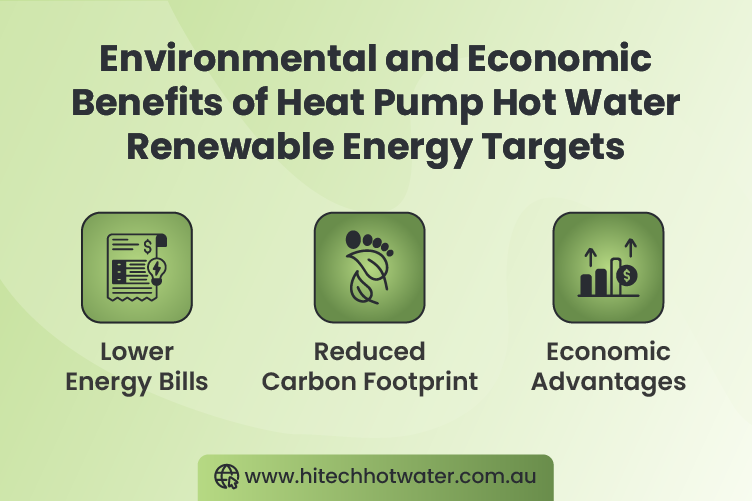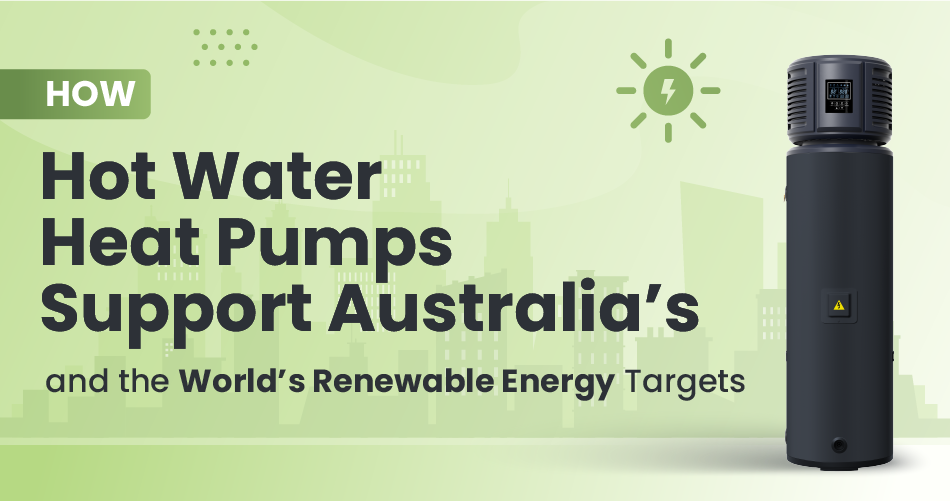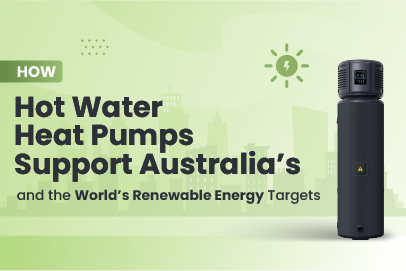Australia and countries worldwide are setting ambitious renewable energy targets to combat climate change, reduce carbon emissions, and lower household reliance on fossil fuels.
Among the many technologies supporting this transition, hot water heat pumps stand out as one of the most practical and effective solutions for homes.
With water heating accounting for a significant portion of energy use, switching to heat pump systems not only reduces emissions but also supports broader national and global renewable goals.
How Heat Pump Hot Water Renewable Energy Targets Are Being Achieved
Household appliances play a critical role in energy consumption, with water heating ranking as one of the biggest contributors to household electricity bills.
Traditional gas and electric water heaters consume large amounts of energy, adding pressure to both household budgets and the environment.
Heat pump hot water systems, however, use ambient air to heat water, cutting energy consumption by up to 60–75%. This efficiency directly contributes to reducing demand on the electricity grid and helps countries move closer to their renewable energy targets.
The Role of Heat Pump Hot Water in Australia Renewable Targets
Australia has set ambitious goals for renewable energy and emissions reduction, including achieving net-zero by 2050. According to Sustainability Victoria, water heating accounts for around 21% of total household energy use a major share that cannot be overlooked.
By replacing old electric resistance or gas hot water units with heat pumps, households across Australia can significantly reduce energy use and carbon emissions.
Programs like the Victorian Energy Upgrades (VEU) and federal Small-scale Technology Certificates (STCs) incentivise this shift, making heat pumps more accessible and aligned with national energy targets.
Heat Pump Water Heaters and Global Renewable Goals
The focus on renewable energy is not limited to Australia. Globally, commitments like the Paris Agreement and net-zero pledges from major economies are pushing households and businesses to adopt cleaner technologies.
Water heating is a universal need, and inefficient systems remain a major energy drain worldwide. Heat pump water heaters, already popular in Europe and Asia, are increasingly seen as an essential component of the clean energy mix.
By reducing fossil fuel reliance, they help governments meet emissions reduction targets while ensuring reliable, cost-effective hot water for families.
Environmental and Economic Benefits of Heat Pump Hot Water Renewable Energy Targets

- Lower Energy Bills – Households can cut their water heating costs by hundreds of dollars each year compared to electric or gas systems.
- Reduced Carbon Footprint – Heat pumps lower greenhouse gas emissions by using ambient air rather than combustion, aligning with sustainability goals.
- Economic Advantages – Reduced energy demand means less strain on the grid, while rebate programs drive demand for local installers and green jobs.
This combination of savings and sustainability makes heat pumps a smart choice for households and governments alike.
Future of Heat Pump Hot Water in Supporting Renewable Energy Transition
Looking ahead, the role of heat pumps in renewable energy strategies will only grow stronger. Their ability to integrate with solar PV and solar battery storage allows households to maximise self-consumption of renewable energy. For example, excess solar power generated during the day can be used to run the heat pump, storing hot water for use at night.
Predictions suggest that adoption of heat pumps in Australia will continue to rise, supported by government rebates and rising gas prices. Globally, policies that encourage electrification and efficiency improvements are driving similar growth.
Renewable Energy Hot Water Solutions Australia for Homes
For Australian households, renewable energy hot water solutions are no longer just a trend they’re becoming the standard. Heat pump systems are suitable for:
- Family Homes – Providing consistent hot water with lower running costs.
- Smaller Homes and Apartments – Compact models that save space while reducing bills.
- Multi-Generational Households – Systems that meet higher demand without driving up energy use.
With tailored solutions available, heat pumps offer reliable and affordable options for every type of home.
Opportunity in Adoption of Renewable Energy Hot Water Solutions
Another important opportunity lies in community-scale adoption. As more households in suburbs and regional areas transition to heat pump hot water systems, the cumulative reduction in energy demand can ease pressure on local grids.
This not only improves grid stability but also accelerates Australia’s progress toward renewable targets, showing how individual household choices can create collective impact.

Challenges and Opportunities for Renewable Energy Hot Water Solutions Australia
Like all emerging technologies, heat pumps face some challenges:
- Barriers – Higher upfront costs, lack of awareness, and the need for professional installation.
- Opportunities – Government incentive, lower lifetime running costs, and increasing availability of energy-efficient models.
- Future Potential – As heat pumps one of the most compatible hot water system with Solar PV Panel & Battery. It is into the consumer benefits to have heat pump hot water system.






